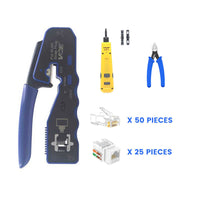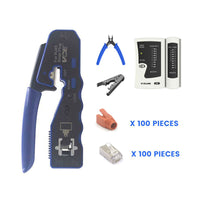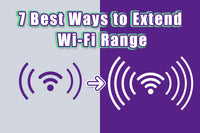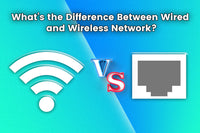Contents
Wi-Fi network is preferred by most people for its flexibility and convenience. However, weak Wi-Fi signals may affect your daily activities, particularly when you’re in a dead zone of your home network. While Wi-Fi routers provide robust coverage, their signals can weaken significantly when obstructed by walls and floors and they can not cover every corner in your home or office. That’s why Wi-Fi extenders and mesh Wi-Fi come into play. But how do these two options differ from each other? What is the best choice for your home network? Let’s explore more in the following content.
What is a Wi-Fi Extender?
A Wi-Fi extender, also known as a Wi-Fi repeater or booster, is a stand-alone device designed to extend the range of your existing network range with wireless technology. It works by receiving the wireless signal from your existing router and rebroadcasting it to cover the specific area of your home and office.
Wi-Fi extenders usually retransmit signals on a different channel and they have a separate network name different from the main network. Devices connect to this extended network and then communicate with the main router. The Wi-Fi extender is often preferred by homeowners thanks to its cost-effectiveness, which can help them effectively broaden their Wi-Fi coverage and eliminate dead zones. But the extender has a disadvantage: incorrect placement can degrade the Wi-Fi signal. For example, if you place the extender far away from the main router or the area where the coverage is needed, you may get a poor performance. The wise way to solve this problem is to place the Wi-Fi extender in an area where the signal from your main network is strong while still being close to the dead zone for a continuous Wi-Fi signal.
What is a Mesh Network?
A mesh network is a system consisting of multiple interconnected devices (also known as access points or mesh nodes) that work together to provide broad Wi-Fi coverage. Unlike Wi-Fi extenders, mesh networks establish a web-like and decentralized structure where each node is connected with each other using wireless technology or via Ethernet. These nodes communicate intelligently to optimize signal strength and ensure efficient data transmission. The more nodes in the network, the wider and more reliable the coverage is.
There are two main types of mesh networks, including full mesh and partial mesh. In full mesh, every node is connected directly to all other nodes, offering maximum reliability and redundancy. In partial mesh, nodes are connected to some but not all, which can balance the performance and cost-effectiveness in some typical residential or office use.
Mesh Network vs. Wi-Fi Extenders
- Coverage: Wi-Fi extenders expand coverage by retransmitting signals from the main router, so they are a cost-effective and practical solution for eliminating small dead zones. However, they are limited in coverage and are not suitable for large areas. The mesh network provides seamless Wi-Fi coverage by creating a system of multiple nodes, which is ideal for large homes, multi-story buildings, or places with many physical obstacles.
- Setup: The Wi-Fi extender has a separate network name and you need to manually switch between the main network and the extended network, which can sometimes be inconvenient if you have many devices. In contrast, the mesh network operates under a single network and devices can automatically connect to the nearest node for an uninterrupted and convenient experience. When it comes to setup, Wi-Fi extenders are generally easier.
- Speeds: Wi-Fi extenders often provide slower speeds because the Wi-Fi signal has to travel from the router to the extender and then back again. The distance between a Wi-Fi extender and a router can also affect the speed. The mesh network offers a higher network speed because of the unified network.
- Scalability: A Wi-Fi extender has limited scalability as it cannot cover all corners of your home or office. In addition, adding more extenders can complicate the network. In contrast, the mesh network can be easily expanded by adding more nodes.
- Cost: The Wi-Fi extender is typically the most cost-effective choice, making them ideal for users who need targeted coverage for small dead zones in their home or office. Wi-Fi extenders provide a budget-friendly solution to weak Wi-Fi signals. While the mesh network can be more expensive because of the advanced technology and multiple nodes.

Mesh Network vs. Wi-Fi Extender: Which One is Better for Your Home Network?
After the comparison of a Wi-Fi extender and a mesh network, you must have a clearer understanding of which one suits your needs. The choice depends on the size of your home and the network performance you want.
-
Home Size and Layout
- For larger homes with multiple rooms, floors, and dead zones, a mesh network is the best choice for a seamless and high-performance network.
- For small homes with only one or two rooms, Wi-Fi is sufficient to eliminate all dead zones.
-
Performance Needs
- If you don’t care about switching between different nodes, the Wi-Fi extender is easy to set up and remains the best choice.
- If you value a high-speed network and seamless internet surfing experience, a mesh network is ideal. Some mesh networks feature advanced technology like tri-band systems for maximum network performance.
Unstable Wi-Fi? Go Wired for a Stable Connection!
For power users with heavy downloading, streaming, and working and gaming enthusiasts, Wi-Fi may fall short of delivering a stable and continuous network. It’s time to consider the wired connection for a stable and continuous network.
To achieve the best network performance, you can upgrade your home network using Cat6 and Cat6a cables. You can DIY the network with Ethernet cables, RJ45 connectors, keystone jacks, and different network tools like RJ45 crimpers and cable testers. Pairing this setup with a high-quality modem and router can maximize the network performance. Investing in wired network connections can help reduce interference, latency and make your online experience smoother.
Final Words
Both the Wi-Fi extender and the mesh network can be the solution for boosting your Wi-Fi network signal. Whether to choose a Wi-Fi extender or mesh network relies on your specific needs, such as the size of your space, your budget, and network demands.
For more information on this topic, you can keep up on our blogs. While VCELINK offers general and basic information for our customers and other visitors to the website, it’s not professional advice.






Be the first one to comment.
Leave a comment